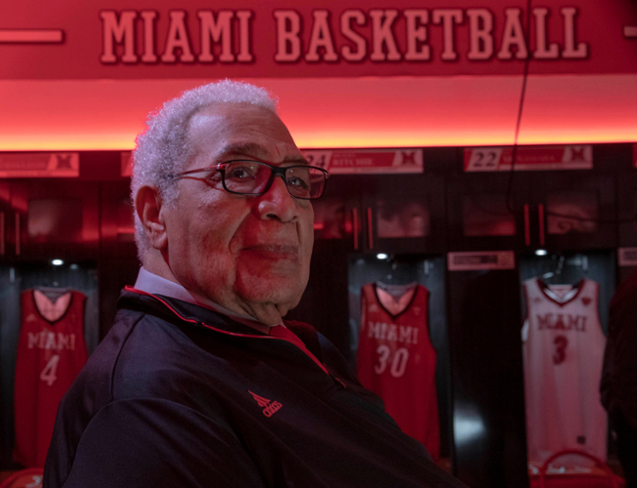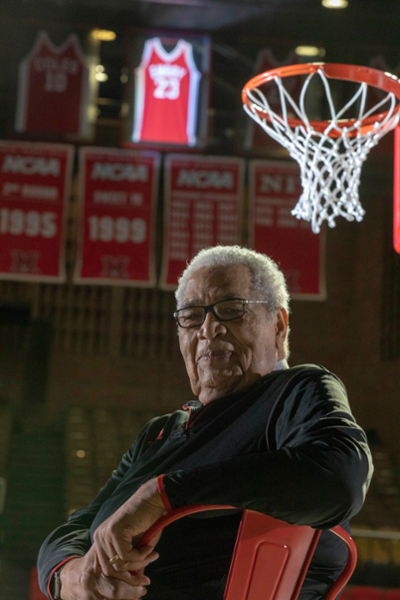Miami University to honor Wayne Embry and his late wife, Terri, with the Freedom Summer of ’64 Award
The award will be presented this spring to Embry and posthumously to Terri, his wife of 62 years, for their “life’s work as civil rights champions, mentors and as an inspiration to so many others.”

Miami University to honor Wayne Embry and his late wife, Terri, with the Freedom Summer of ’64 Award
Miami University will honor NBA executive and basketball icon Wayne Embry (Miami ’58) and his late wife, Terri Embry (Miami ’60), with the Freedom Summer of ’64 Award. The award is bestowed by Miami University each year upon a distinguished leader who has inspired the nation to advance civil rights and social justice.
The award will be presented this spring to Embry and posthumously to Terri, his wife of 62 years, for their “life’s work as civil rights champions, mentors and as an inspiration to so many others.”
The Embrys were selected for the annual award to honor their lifetime of commitment to social justice, for breaking racial barriers and for their mentorship.
“Wayne’s success on the court and his achievements as a sports leader laid the foundation and provided the inspiration to the generations who have followed him,” President Gregory Crawford said. “From Terri’s march across the bridge in Selma, to her service to the community, and her mentorship and support of ‘her guys’ in the NBA and their wives, she touched many lives and advanced social justice in all she did.”
Embry said he is honored to receive the award and added that Terri — whom he called "a fierce proponent and thoughtful activist" — would be extremely humbled and honored.
"Terri and I were partners in life, in our values and in a common belief that we needed to actively and steadfastly work to create equal opportunity for all and unite amongst our differences to make the world a better place."
Honoring Number 23

Wayne Embry sits on the court with his retired jersey in the background (photo by Jeff Sabo).
Embry, a Dayton-area native, was a standout basketball player at Miami from 1954-1958. He overcame racial barriers as one of the university’s first Black student-athletes. He was inducted into Miami’s Athletics Hall of Fame in 1970 and is one of only six Miami men’s basketball players to have had his number retired. (He appears in Miami’s video, From Now On.)
Embry’s more than 50-year NBA career began as a player for the Cincinnati Royals in 1958. He was the team’s standout center until he joined the Boston Celtics in 1966.
After finishing his playing career in 1969 as the Milwaukee Bucks’ first-ever team captain, he became the team’s general manager and NBA’s first Black general manager in 1972. The Bucks made it to the playoffs four times during his eight seasons as general manager.
In 1985, he became vice president and general manager of the Cleveland Cavaliers and rose to the role of Cavaliers’ executive vice president in 1992. In 1994, he became team president and chief operating officer — the first Black to hold these roles in NBA history.
In 2004, Embry became senior basketball advisor to the president of the Toronto Raptors, a position in which he continues to serve. He was interim general manager in 2006 and played a critical role in the Raptors’ 2019 NBA championship.
In recognition of Embry’s contributions to his university, the state of Ohio and his transformative impact on the sport of basketball, a statue capturing his likeness and signature hook shot will become the first honoring a Black alumnus at Miami. It will be located prominently at the main entrance of Millett Hall, the basketball arena where the RedHawks play. Plans are to dedicate the statue this spring.
Terri’s community activism

Terri Embry earned a bachelor's degree from Miami.
Embry served on his alma mater’s board of trustees for 14 years, including one year as chairman of the board. His service further included the College of Education, Health and Society’s (EHS) advisory board, with Terri, who died on Aug. 27, 2020 at age 82. She earned a bachelor’s degree in education from Miami and later served on EHS’s Teachers Advisory Committee.
As a fearless community activist, she joined Martin Luther King Jr. and others for the now historic march from Selma to Montgomery, Alabama — part of a series of civil rights protests that led to passage of the Voting Rights Act of 1965.
Terri Embry fought for racial equity and inclusion for more than 50 years. Her community volunteer experience spanned the Midwest, having served as board chair of two different Urban League affiliates, in Cleveland and Milwaukee.
The Freedom Summer of ’64 Award
Miami presented Congressman John Lewis with the inaugural Freedom Summer of '64 Award in Washington. D.C. in 2018. Other recipients include the Mt. Zion United Methodist Church in Philadelphia, Mississippi, in 2019; radio broadcaster and civil rights advocate Joe Madison, and Carolyn Jefferson-Jenkins, the first woman of color to be elected president of the League of Women Voters, both in 2020.
Miami marked the 50th anniversary of local Freedom Summer history in 2014.
In 1964 in Oxford — at what was then the Western College for Women but is now part of Miami University’s Western campus — Student Nonviolent Coordinating Committee (SNCC) leader Bob Moses led the training of 800 college students to travel south to register African American voters.
Miami strives to honor the legacy of those who worked for civil rights and social justice and, in the case of Michael Schwerner, 24, James Chaney, 21, and Andrew Goodman, 20, Freedom Summer activists who gave their lives in service to humanity.
The Freedom Summer of ’64 Award recognizes the spirit of those 800 students who assembled in Oxford for the Mississippi Summer training sessions. It is steeped in the belief that by understanding the past, we can build a more just and inclusive future.
“We believe that all Wayne and Terri have done in the service of this nation and world embodies the qualities of the past and sets an example for all we hope to do in the future,” Crawford said.
